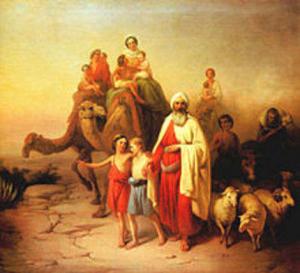Sometimes, God changes a person’s name, but why? What’s His purpose for doing so?
Old Testament
There are several instances where God changes a person’s name in the Bible. You don’t have to look very far to find out that Abram’s name was changed to Abraham…Sarai to Sarah…Jacob to Israel, and a few others, but why? God never does anything without purpose, so there is a purpose behind it. When we look at Jacob, we see a man who was a schemer who cheated Esau out of his birthright and blessing, so it’s no wonder Jacob’s name means “He who strives” or “supplanter.” To supplant something means to “undermine, to take the place of, to take over from, or to substitute for” and he did that until after wrestling with God all night, God changed His name to Israel, which means “He who strives with God,” and Israel did strive with God…all the way to the Promised Land, and then some! As for Abraham, he was first called Abram, meaning “exalted father,” but God later changed His name (Acts 17:5) to Abraham, meaning, “father of a multitude” or even “exalted father of a multitude,” and Abraham is seen as the father of the Jews. God also changed Sarai’s name to Sarah, meaning, “lady, princess,” or “noblewoman,” and that she was. She even shows up along with Abraham in the so-called “Hall of Faith” (Heb 11).
New Names in Heaven

When the Apostle John was writing about the church, he wrote, “He who has an ear, let him hear what the Spirit says to the churches. To the one who conquers I will give some of the hidden manna, and I will give him a white stone, with a new name written on the stone that no one knows except the one who receives it” (Rev 2:17). No one can say what the white stone is about, nor does anyone have a clue about what our new names will be in heaven, but perhaps they will be names that described a major attribute of ours or something we did that we had a passion for. Even then, it says, “no one knows except the one who receives it,” so it will be a mystery until that day (See, Rev 21:1-5). Later, John adds that “The one who conquers, I will make him a pillar in the temple of my God. Never shall he go out of it, and I will write on him the name of my God, and the name of the city of my God, the new Jerusalem, which comes down from my God out of heaven, and my own new name” (Rev 3:12). So believers will have Jesus’ name as well as “the name of my God.” Even though we’re told we’ll have new names, there is no way to know what that name will be, but one thing we do know is that when “God comes down out of heaven,” He will make all things new, apparently including our names (Rev 21:5).
Saul to Paul
If you read enough of the Bible, you’ll see that God often names people for their attributes or character traits, but I’ve noticed that sometimes God will change a person’s name when there is a change of character. We see this when Saul’s name began to dissapear and the name Paul began to be used more often. Although it doesn’t say God changed Saul’s name to Paul, there is a change. At first, Saul sought to destroy the church, but after conversion, he then evangelized for the church as Paul, so Saul went from seeking to destroy the Way to one who pronounces the Way, and the Way is a reference to the early church. What was the way? This comes from Jesus’ own words that He is the one and only way we can be saved (John 6:44; Acts 4:12). Jesus says He is the way, the truth, and the life. Not “a way” or “a truth,” but the truth and the way, and there is no other (John 14:6). Saul’s name may be closely related to the Hebrew name Shaul, which means “to ask for,” and interestingly, Saul approached the high priest and “asked him for letters to the synagogues at Damascus, so that if he found any belonging to the Way, men or women, he might bring them bound to Jerusalem” (Acts 9:2). There is also the fact that Saul and Sheol are spelled the same in the Hebrew, although pronounced differently. We do similar things with our own vocabulary, so sheol means “a pit” or “a grave,” or “mankind’s common grave,” or “the abode of the dead.” What we gather from all this is there is a sharp contrast between the meanings of the names Saul and Paul. God changed Saul’s heart, as only God can do (Prov 21:1), so God changed Saul’s name to go along with his new heart. He was a now a new creation in Christ (2 Cor 5:17). He was no longer the old man…Saul.

Conclusion
The day will come when God calls us home, or Jesus’ splits the sky and returns to begin His reign. At that time, there will be “a new heaven and a new earth, for the first heaven and the first earth had passed away, and the sea was no more” (Rev 21:1). That’s when everything changes, and “the dwelling place of God is with man. He will dwell with them, and they will be his people, and God himself will be with them as their God” (Rev 21:3). The old things will be gone, which means God will have to “wipe away every tear from their eyes, and death shall be no more, neither shall there be mourning, nor crying, nor pain anymore, for the former things have passed away” (Rev 21:4). This is new. It makes sense that the One “who was seated on the throne said, “Behold, I am making all things new” (Rev 21:5). Part of Jesus’ making all things new will probably mean our old names will be gone. We’ll be given new names in the kingdom (Rev 2:17, 3:12). That’s because we’ll all be new creations. New creations should get new names, don’t you think?
Article by Jack Wellman
Jack Wellman is Pastor of the Mulvane Brethren Church in Mulvane Kansas. Jack is a writer at Christian Quotes and also the Senior Writer at What Christians Want To Know whose mission is to equip, encourage, and energize Christians and to address questions about the believer’s daily walk with God and the Bible. You can follow Jack on Christian Crier or check out his book Teaching Children the Gospel available on Amazon.















